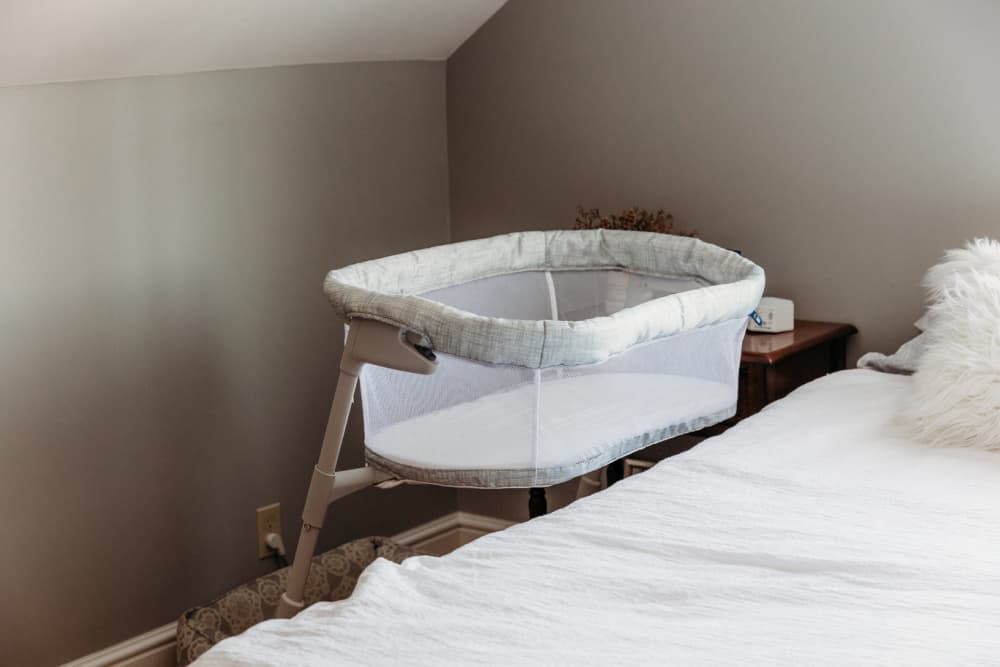Sleep Deprivation After Having A Baby: Survival Tips From A Sleep Consultant
After my 40 hour labor, I transitioned into feeding a baby 24/7 for 48 hours in the hospital. I was fueled by adrenaline and pure excitement. I don’t even remember being tired! I was waited on hand and foot by the nursing staff- brought my meals and only had to get out of bed to pee. But then…I went home. And boy did the sleep deprivation hit HARD. My support system had fell apart and it was all me and this sweet little bundle of joy….that wouldn’t stop crying and never slept longer than an hour at a time. If it happened to me, with my years of experience and education and understanding of newborns- I fear for the new uninformed and underprepared parent!
Sleep deprivation after having a baby is no joke. Inadequate sleep can quickly lead to feelings of frustration, arguments with your partner, and physical ailments. Let’s explore some sleep deprivation survival tips to help you through the thick of it.
Be Prepared for what is “normal” newborn sleep

There’s a lot about new parenthood that you can’t prepare for. But sleep isn’t one of them! Learn about normal newborn sleep during your pregnancy. Knowing what to expect can help you feel better prepared. Here are a few highlights of things all parents of newborns should understand.
- The first four weeks with a newborn can be very difficult. Overnight they will likely eat every 2-3 hours and wake up in between for diaper changes, gas, or cuddles.
- Babies are noisy sleepers! Have you ever watched a dog sleep, chasing squirrels in their dreams? It’s kind of like that. Twitching, grunting, even smiling and grimacing. These are all normal sleeping baby things. Don’t run in and disrupt their sleep until they clearly show you that they are awake.
- Baby Sleepy Cues. If you can catch your baby when they are tired, they’ll get more sleep [and you’ll get more sleep!] Overtired babies are extra fussy and harder to get down.
- Try to get them on a schedule. Scheduling feedings can help bring order to what feels like chaos, if you are breastfeeding and you know when your baby will need to eat, then you know when you have the time/space to sleep!
Set the Scene for Healthy Sleep

Set up a healthy sleep environment for your baby. Remember, if they get more sleep, YOU get more sleep! Healthy sleep habits from day one promote better sleep for the whole family.
- Baby on their back in a safe sleep surface like a bassinet or crib [we don’t need to add SIDS anxiety to the reasons why we can’t sleep at night]
- white noise machine [It’ll also help you not listen to their every grunt]
- Blackout curtains
- Pacifier [you’ll thank me later. Reaching over and popping a pacifier into a fussing baby’s mouth and having them go back to sleep is the best parent-hack known to man. You can always wean it out later.]
- Safe/comfortable room temperature [ideally around 70 degrees]
- Swaddle that baby!
Work as a Team

If you have a partner- use them to their strengths. Let’s go over some plans I’ve recommended for parents in the past. There are a number of more options that weren’t listed here!
Scenerio 1: Breastfeeding Mom, and Dad share the night
Mom feeds the baby at 9pm and goes to bed. Dad takes the baby far away from mom until the baby’s next feeding around Midnight. Dad sleeps in a different room with a sound machine from midnight to 6am. At 6am mom feeds the baby and hands him off to dad. Dad takes the baby so she can sleep soundly until the next feeding around 9am. Throughout the day they collaborate and trade off for naps if needed. Both parents have uninterrupted sleep to look forward to.
Scenerio 2: Two Dads are Bottlefeeding and share the night
Daddy takes over baby care and feedings from 7pm-1am and then Dad takes over baby care and feedings from 1am-7am. This works out because Daddy is a night owl and Dad doesn’t sleep well early mornings anyways. They both have uninterrupted sleep to look forward to.
Scenerio 3: Breastfeeding mom does night and dad does day
Dad has to go back to work early and has a history of seizures with sleep deprivation, and mom wants to give him as much sleep as possible to ensure his mental and physical health. Mom does the entire night until 5am, when dad takes the baby until he has to leave at 7am. When dad comes home at 4pm he takes the baby from mom so she can shower, nap, or whatever else she wants/needs to do until bedtime. They both respect that caring for a newborn is a full-time job.
Scenerio 4: Single mom enlists support from friends/family
Mom doesn’t have a partner and she knows that she doesn’t do well without sleep. When her friends and family ask how they can help- she sends them out a calendar with times to sign up for to watch the baby.
So 3-4 times a week, loved ones come over and she leaves the baby in their care to get a solid and much needed nap! She doesn’t worry about entertaining them, and the expectation is clear.
Remember that baby care isn’t the only way to help
Some new parents don’t want to hand off their baby, but they are too tired to keep up with other tasks. Partners and caregivers can load the dishwasher, fold laundry, or take the trash out. The less energy you put into household chores, the more energy you can put into healing and bonding with your baby. [And you’ll have more opportunities to catch up on sleep, too!]
Hire a Professional

Parenthood is not meant to be a solitary act. Let’s say that louder for the people in the back. Humans are pack creatures, and so many of us are without a tribe.
Professional support from a newborn care specialist or postpartum doula has many proven benefits. Parents with postpartum support report better satisfaction with parenthood and lower rates of anxiety and depression. Sleep deprivation can quickly lead to mental fog, mood changes, weakened immunity, and higher incidences of health issues like high blood pressure. Overnight care or 24 hour care is a wonderful option in the newborn days to help parents cope with sleep deprivation. Consistent overnight support can help your baby to develop good sleep habits while you catch up on much-needed rest. Daytime nanny care is also a great choice for families who would like extra household support or care for older children.
There is never any shame in asking for help!!
When you and your baby are ready (at 5+ months), a professional can help with sleep training your baby to solidify healthy sleep habits for the long term. Formal sleep training is appropriate for babies 5 months and up who struggle with nighttime wake ups, short naps, or very early morning wake ups.
Put Sleep Deprivation Survival Tips to Action
- Watch our video series! We focus on preparing for a steps free homecoming, putting everything you need into place and education to feed confident in the process.
- Make a plan with your partner or friends for how you’re going to get ahead of sleep deprivation. Don’t wait until you’re already tired!
- Are you considering professional support? Book it NOW. Many newborn care specialists and postpartum doulas book out 3-6+ months in advance!
Making arrangements to promote rest for the whole family ahead will help make the transition to parenthood a smooth and enjoyable one, a fleeting season that you will look back on fondly.

We are Kristin and Karina, founders of Baby Care Classes. As sleep Consultants, Newborn Care Specialists and overall baby gurus, we wanted to share our experience and knowledge with you to help you be successful in your parenting journey.
Kristin + Karina
FOUNDERS, BABY CARE CLASSES

Having a baby? Prepare with our comprehensive online baby care class!

Explore the Blog

